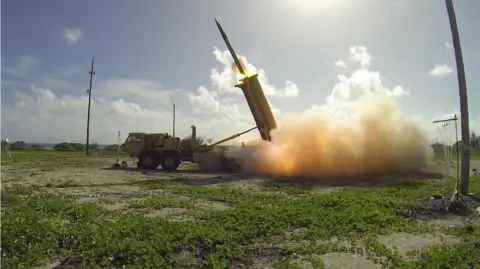 AFP via Getty ImagesEach Thaad system – like this one seen in an archive photo – costs about $1bn (£766m)The Pentagon has confirmed it is sending a high-altitude anti-missile system operated by US troops to Israel.
AFP via Getty ImagesEach Thaad system – like this one seen in an archive photo – costs about $1bn (£766m)The Pentagon has confirmed it is sending a high-altitude anti-missile system operated by US troops to Israel.
Officials say the Terminal High-Altitude Area Defense (Thaad) battery will bolster Israeli air defences after Iran’s missile attack on the country earlier this month.
President Joe Biden has said it is meant "to defend Israel", which is still expected to retaliate against an Iranian strike involving more than 180 ballistic missiles fired at Israel on 1 October.
The move has become the focus of attention as it involves putting American boots on the ground in Israel.
There are already a small number of US forces in the country – but this new deployment of about 100 troops is significant as it signals further US entanglement in the expanding regional war.
It is also being scoured for clues as to what it means about the effectiveness of Israel’s missile defences as the crisis grows.
Israel has yet to launch its retaliation for Iran’s attack, which will be "lethal, precise and above all, surprising" according to Defence Minister Yoav Gallant.
Tehran said it fired on Israel because it assassinated Hassan Nasrallah, the leader of Iranian-backed Hezbollah, in Beirut.
Follow live updates on this storyAnalysing footage from the Gaza strikesWatch: ‘I say bye to my kids, in case we don’t wake up’ – two Gazans film a year under attack by IsraelAnalysis: Drone attack on Israel puts spotlight on Iron Dome's limitationsGaza Strip in maps: How a year of war has drastically changed life in the territoryThe Pentagon said an advance team and components needed for the battery arrived in Israel on Monday – with further personnel and parts to follow in the coming days. The battery will be operational in the “near future”, a statement said.
Israeli journalist Avi Scharf, who routinely monitors flight tracking data, said two C-17 US military transporters flew from Alabama to the Israeli Air Force's Nevatim base overnight, likely carrying Thaad equipment.
It’s still unclear whether the Thaad deployment is part of US contingency planning to bridge gaps identified in Israel’s aerial defences, or whether it points to growing concerns in Washington of a more forceful Israeli strike on Iran.
President Biden has opposed any attack on Iranian nuclear facilities, as well as on its oil or energy infrastructure, amid fears that it would trigger a spiralling conflict and affect the global economy.
Whatever the background to the decision, it signals a further need by Israel for US defence assistance amid the expanding Middle East war.

About the author